Picking the right sliding door feels overwhelming. A bad choice leads to high energy bills and constant repairs. This guide will help you choose the best material for your needs.
To choose the right sliding door material, you need to balance your budget, climate, and style. The main options are vinyl, aluminum, fiberglass, and wood. Each has clear pros and cons related to cost, durability, and energy efficiency that you must consider.
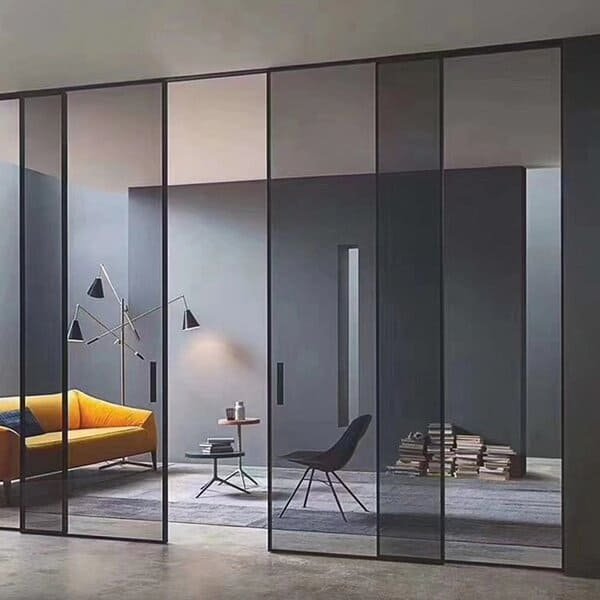
Choosing a sliding door isn’t just about looks. It’s a long-term decision that impacts your comfort and your wallet. As someone who manufactures the hardware that makes these doors work, I’ve seen which materials last and which ones fail. Let’s break down the options so you can make a choice you won’t regret.
What is the best material for sliding doors?
You want the "best" material for your project. But what "best" means is confusing because every project is different. Let’s find out what "best" means for you.
There is no single "best" material for all sliding doors. It depends on your priority. Fiberglass offers the best overall performance and durability. Vinyl is best for a tight budget. Aluminum is best for modern style and strength. Wood is best for classic, high-end looks.
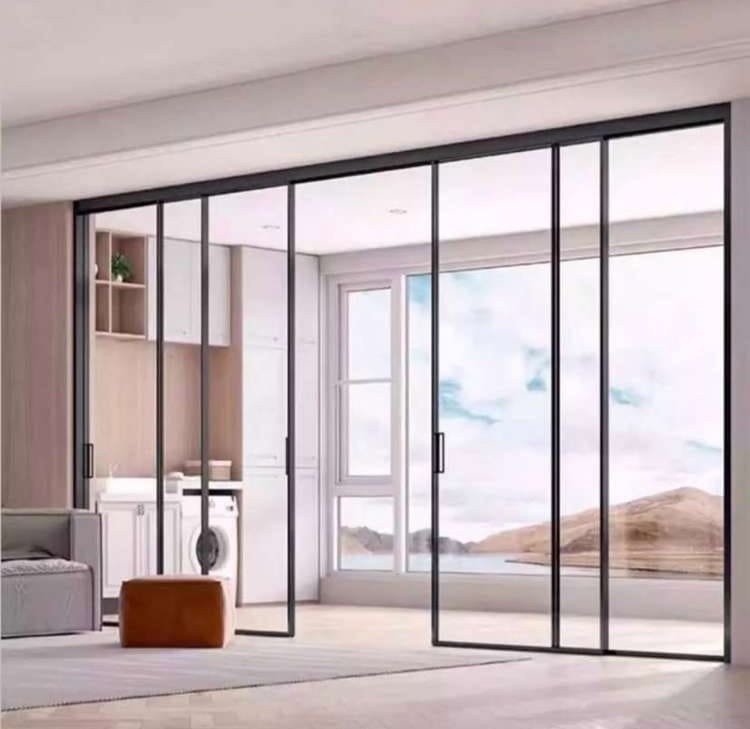
In my factory, we create hardware systems for doors made from all kinds of materials. I often talk to purchasing managers like Alice from France. He needs doors that can handle cold winters. A builder in a hot, humid area has different needs. The "best" choice is the one that solves your specific problems. Let’s look at the options more closely.
Comparing the Top Contenders
To simplify things, I’ve put the four main materials into a table. This shows you how they stack up against each other on the most important factors.
| Feature | Vinyl | Aluminum | Fiberglass | Wood |
|---|---|---|---|---|
| Upfront Cost | Low | Low-Medium | High | Very High |
| Durability1 | Good | Very Good | Excellent | Fair |
| Energy Efficiency2 | Very Good | Fair | Excellent | Poor |
| Maintenance | Low | Low | Low | High |
| Best For | Budget Projects | Modern Homes | All Climates | Luxury Homes |
Making Your Choice
Look at the table and think about your top priority. If budget is everything, vinyl is your starting point. If you live in a place with extreme weather, like harsh winters or intense heat, fiberglass is a smart investment. It won’t warp, crack, or break down. For a sleek, modern look with lots of glass, aluminum’s strength is perfect. And if you want a timeless, beautiful door and don’t mind the upkeep, nothing beats real wood.
Which is better, vinyl or fiberglass sliding doors?
Vinyl and fiberglass are two popular choices. They look similar but have major differences in performance. Let’s put them head-to-head to see which one is the right fit.
Fiberglass is better than vinyl in almost every way. It is stronger, more energy-efficient, and lasts longer. It also costs more. Vinyl is a great low-cost, low-maintenance alternative, but it is less durable and can warp or crack over time.
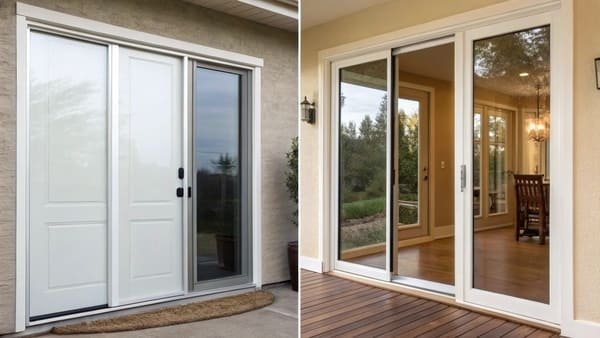
The choice between vinyl and fiberglass often comes down to budget versus long-term performance. I’ve seen clients happily use both, but for very different reasons. A developer building rental units might choose vinyl for the low cost. A homeowner building their dream house will likely invest in fiberglass.
The Durability Factor
Fiberglass3 is incredibly strong. It’s made from glass fibers, so it expands and contracts very little with temperature changes. This means it won’t warp in the summer heat or become brittle and crack in the winter cold. This is a huge plus for people in climates with four seasons. Vinyl is a plastic, so it is more sensitive to temperature. Over many years, this can lead to seals failing and frames warping, causing drafts and operational issues. From a hardware perspective, a stable frame like fiberglass puts less stress on rollers and locks over the door’s lifetime.
The Cost vs. Performance Trade-off4
There’s no question that vinyl is cheaper upfront. For many projects, that’s the deciding factor. It provides good insulation and requires almost no maintenance, making it a very practical choice. However, fiberglass is an investment. It costs more initially, but its superior durability and energy efficiency can save you money in the long run on energy bills and replacement costs. Fiberglass3 frames can also be painted, so you can change the color down the road. You can’t do that with vinyl.
Which is better mild steel or aluminium sliding doors?
You might hear about metal doors and wonder about steel. Steel is strong, but is it good for sliding doors? Let’s compare it to the most common metal option: aluminum.
For sliding doors, aluminum is much better than mild steel. Aluminum is lightweight, naturally resistant to rust, and affordable. Mild steel is very heavy and rusts easily without constant maintenance, making it a poor choice for a typical patio door.
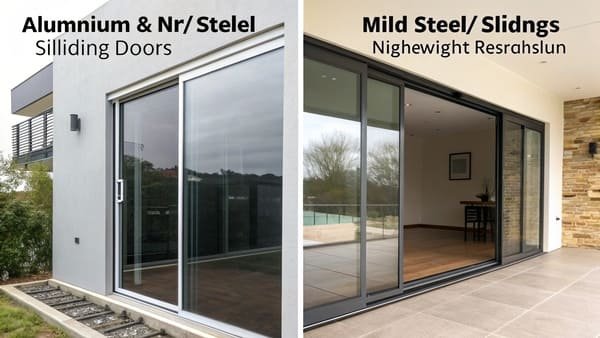
In my business, we design rollers for different door weights. A solid steel door would require an industrial-level hardware system. It’s just not practical for most homes or buildings. Aluminum, on the other hand, strikes the perfect balance.
Why Aluminum Dominates
Aluminum is the standard for metal-framed sliding doors5 for good reasons. First, it’s strong but also lightweight. This means you can have very thin frames, which creates a clean, modern look with a bigger glass area. Less frame and more view is a very popular trend right now. Second, aluminum doesn’t rust. It develops a natural protective layer when exposed to air. This makes it perfect for outdoor use with very little maintenance. For better energy performance, manufacturers use something called a "thermal break6"—a plastic insulator inside the frame to stop heat and cold from passing through.
The Problem with Steel
Mild steel’s biggest enemy is rust. The moment a steel door gets a scratch in its paint, moisture gets in, and rust begins. Preventing this requires constant vigilance and maintenance. Steel is also extremely heavy. A heavy door puts incredible strain on the rollers, track, and frame. This leads to faster wear and tear on the hardware and makes the door difficult to open and close. While steel is very strong and secure, its weight and rust problems make it a bad fit for a functional, easy-to-use sliding door.
Which is better, vinyl or aluminum sliding doors?
Vinyl and aluminum are two of the most popular, budget-friendly materials. But their differences have a big impact on your home’s comfort and style. Let’s see which one wins for you.
Choose vinyl for the best energy efficiency and insulation, especially in cold climates. Choose aluminum for its strength, slim and modern profile, and durability. It can support much larger glass panels than vinyl but is a poor insulator without a thermal break.
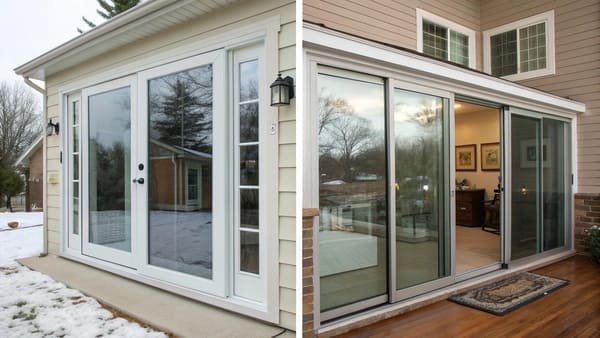
This is a very common decision for my clients. The final choice almost always depends on two things: climate and desired style. Both can be great options, but you need to pick the right one for your specific location and building design.
The Energy Efficiency Battle
This is where the two materials are most different. Vinyl is a natural insulator7. The frames are made with multiple hollow chambers inside that trap air, which slows down heat transfer. This helps keep your home warmer in the winter and cooler in the summer. Standard aluminum is the opposite. It’s a conductor, so it transfers heat and cold easily. This is why you should only consider "thermally broken" aluminum frames for exterior doors, especially in places with cold winters or hot summers. Even then, a good vinyl frame will usually offer better insulation.
Strength and Style
This is where aluminum shines. It is much stronger than vinyl. Because of this strength, aluminum frames can be much thinner. If you want a minimalist, modern design with huge panes of glass, aluminum is the way to go. A vinyl frame would need to be much thicker and bulkier to support the same size of glass, which would block your view. Aluminum is also very durable and won’t get brittle or crack over time like vinyl can in extreme sun or cold.
Conclusion
Choosing the right door material isn’t hard. Just balance your budget, your local climate, and the style you want to find the perfect fit for your home or project.
Exploring durability will guide you in selecting materials that last longer and require less frequent replacements. ↩
Understanding energy efficiency can help you choose materials that save money and reduce environmental impact. ↩
Explore the advantages of fiberglass, including its strength and durability, which can significantly impact your building projects. ↩ ↩
Understanding this trade-off can help you make informed decisions for your home, balancing initial costs with long-term benefits. ↩
Explore this link to understand why metal-framed sliding doors are preferred for their strength, aesthetics, and functionality. ↩
Learn about thermal breaks and how they enhance energy efficiency in aluminum doors, making them a smart choice for homeowners. ↩
Explore the advantages of natural insulators like vinyl for energy efficiency and comfort in your home. ↩

